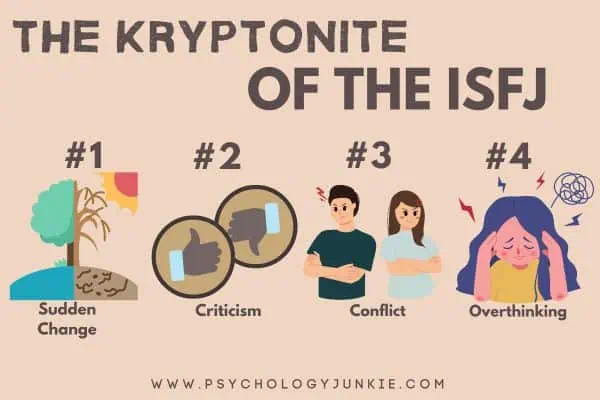Do you ever feel like your normally steady, dependable self suddenly turns into someone you barely recognize when stress piles on? Maybe you usually keep everything running smoothly, but then, under pressure, it’s like something in you flips. That strange, out-of-character version of you? That might be “grip stress.”
Not sure what your personality type is? Take our in-depth personality questionnaire here. Or you can take the official MBTI® here.


The ISFJ and Grip Stress: What It Looks Like and How to Get Out of It
So what is grip stress, exactly?
For ISFJs, life is usually about creating stability, caring for people, and honoring responsibilities. You’re dependable. Grounded. You’re the person who remembers the details everyone else forgets, the one who shows up when it counts. But when stress stretches you beyond your normal limits—when all the lists, routines, and supportive instincts stop working—you get hijacked by one of your less-developed mental processes: Extraverted Intuition (Ne).
When this happens, the calm, reliable ISFJ suddenly gets bombarded with wild possibilities and “what if” scenarios. Instead of keeping things in order, you might find yourself spiraling with catastrophic predictions or strange, symbolic meanings that make no sense. It’s disorienting, exhausting, and a little scary because it feels so unlike the “you” you know best.
The Normal ISFJ Mode vs. Grip Stress Mode


Most days, you’re led by a cognitive function called Introverted Sensing (Si). This is the part of you that’s grounded, detail-oriented, and anchored in what’s real and reliable. Si helps you create stability through routines, traditions, and careful planning. It allows you to learn from past experiences, apply lessons, and maintain a sense of safety, not just for yourself, but for everyone you care about.
But in grip stress, it’s like Si gets shoved into the back seat and Extraverted Intuition (Ne) grabs the wheel. Ne is your inferior function, the one that usually stays quiet in the background. Ne is all about possibilities, alternatives, and “what if” thinking. When you’re at your best, a little Ne shows up playfully—helping you brainstorm or imagine new outcomes. But when you’re under severe stress, Ne doesn’t come in playfully. It barges in like a panicked conspiracy theorist with a megaphone.
Instead of staying calm and pragmatic, your brain starts firing off unpredictable ideas, often negative ones:
- “What if everything I’ve built comes crashing down?”
- “What if I get sick and can’t take care of anyone?”
- “What if this small mistake ruins my entire career?”
This isn’t your normal way of thinking. It’s like your mind is trying on someone else’s glasses, but the prescription is way off. Everything looks distorted.
An Example
Imagine you’ve had one of those weeks. Work deadlines are breathing down your neck, your family needs you for three different things at once, and on top of it all, you’ve been running on less sleep than usual. Normally, you’d just put your head down, check off your lists, and push through.
But this time, nothing seems to help. The stress keeps piling up. You try to make another list, but instead of calming you down, it makes you feel like the walls are closing in. That’s when Extraverted Intuition sneaks in and flips the switch.
Suddenly, your mind isn’t focusing on the task in front of you, it’s racing into ten different “what if” futures. You catch yourself thinking:
- “What if I forget something important and everyone realizes I’m not dependable?”
- “What if I lose my job and we end up homeless?”
- “What if this minor health symptom turns into something catastrophic?”
I once worked with an ISFJ client who described it like this:
“Usually, I can keep things together with my lists and routines. But when I get into that stressed-out place, I freak out completely. I’ll convince myself that one late bill is going to destroy my whole financial future. Or if a friend doesn’t text me back, I’ll start thinking they secretly hate me. It feels ridiculous when I say it out loud, but in the moment, it feels completely real.”
That’s grip stress for the ISFJ: the dependable caretaker suddenly feeling hijacked by catastrophic what-ifs, seeing hidden meanings in every little thing, and doubting the very stability they usually provide for others.
6 Ways Grip Stress Might Show Up for ISFJs
Grip stress isn’t just a “bad mood.” It feels like someone swapped out your personality for a more anxious, dramatic version that doesn’t quite fit. Here are some common signs ISFJs experience when their inferior Extraverted Intuition takes over:
1. Catastrophic “What Ifs”
Like I mentioned before, normally you’re grounded in the here-and-now, carefully managing details. But in the grip, you start spinning worst-case scenarios out of thin air. A small mistake becomes a domino that ends in complete disaster. For example, a misplaced file at work morphs into “I’ll lose my job, we’ll lose the house, and everything will collapse.”
2. Obsessing Over Hidden Meanings
You’re usually practical and straightforward, but during grip stress, you may start reading into everything. A coworker’s tone, a friend’s late reply, or even a small coincidence might feel loaded with hidden significance. It’s like your brain becomes a conspiracy theorist, searching for proof that something terrible is about to happen.
3. Self-Doubt and Harsh Inner Criticism
ISFJs are known for being reliable and conscientious, but in grip stress, that reliability gets twisted into self-criticism. You might start telling yourself you’re not good enough, that you’ll let everyone down, or that you’re bound to fail. This harsh inner voice drowns out the calm confidence you usually project.
4. Restlessness and Scattered Energy
Normally steady, in grip stress you might find yourself bouncing between tasks without finishing anything. The usual satisfaction you get from order and completion disappears, replaced by a kind of anxious scrambling.
5. Irritability and Withdrawal
ISFJs are typically warm and supportive, but when stress drags on, you may feel snappier with loved ones or pull away altogether. One ISFJ told me, “I hated being around my family when I was stressed because I felt like I was just going to snap at them for nothing. I didn’t even recognize myself.”
6. Uncharacteristic Pessimism
You’re normally someone people count on for steadiness and perspective. But in grip stress, your optimism takes a hit. You might feel like the future is bleak, that your efforts don’t matter, or that the problems ahead are too big to face.
An example from a client:
I once worked with an ISFJ client who was juggling a demanding job and caring for her aging parents. Normally, she was super routine-oriented and careful. Her planner was always neat, meals prepped, and her calendar organized. But when her dad had a sudden health scare, all that steadiness collapsed.
She described it like this: “I felt like I was drowning in possibilities. What if he doesn’t get better? What if I can’t handle all of this? What if my boss realizes I’m distracted and fires me? What if I ruin everything?”
Suddenly, she felt scattered instead of focused. She found herself darting around, starting laundry, abandoning it halfway, pulling out bills but never finishing them, staying up late scrolling through health forums and catastrophizing. She told me, “It didn’t even feel like me. I’m usually the calm one who has everything in order, but I was second-guessing every move and spinning out.”
That moment is just one of many examples of grip stress I’ve heard about from ISFJs. It’s overwhelming and chaotic and frustrating.
How to Get Out of the ISFJ Grip
When you’re in grip stress, your mind feels hijacked by catastrophic “what ifs” and scattered energy. The key to climbing out is to reconnect with your natural strengths—your steadiness, your grounding in reality, and your ability to care for yourself as well as others. Here are some strategies that can help:
1. Anchor Yourself in the Present
Grip stress drags you into the future with endless possibilities and disasters. To counter this, use your senses to root yourself back in the here and now.
- Try grounding techniques: notice five things you see, four you feel, three you hear, two you smell, one you taste.
- One ISFJ client told me, “I go outside barefoot and stand in the grass. It reminds me I’m here, I’m okay, and not everything is falling apart.”
2. Revisit a Familiar Routine
Routines are your safe haven. When everything feels chaotic, go back to something small and steady that you know by heart—making tea the way you like it, rereading a comforting book, or following your morning ritual. Even tiny, repeatable routines reassure your nervous system that the world isn’t as unstable as your brain is insisting.
3. Write It Down—Then Reality Check It
Your stressed mind generates endless “what if” scenarios. Instead of letting them rattle around, put them on paper.
- Then, ask: “Is this likely? What evidence do I have?”
- One ISFJ I coached found relief by journaling her fears and then labeling them “probable” or “unlikely.” Most landed in the “unlikely” pile, which helped her laugh at how convincing stress had made them feel.
4. Do a Small, Tangible Task
Grip stress thrives on mental chaos. Push back by finishing something simple in the real world. Organize a drawer, fold a load of laundry, or cook a favorite meal. These tiny wins remind you that you can create order and stability, even if your mind says otherwise.
5. Create Gentle Alone Time
ISFJs are often surrounded by people to care for, but in grip stress, you need a little space to hear yourself think. Step back without guilt, even if it’s just for half an hour. Go for a quiet walk, sit in your car and breathe, or shut the door and let yourself reset. That pause can keep you from spiraling further.
6. Talk to a Trusted Friend
Once you’ve calmed down a little, share what you’re experiencing with someone who knows you well. ISFJs sometimes bottle things up until they explode. Venting to a trusted friend can take the sting out of irrational fears. It can also help you to sort out your feelings and make sense of the “why” behind them.
7. Engage Your Inferior Function in a Healthy Way
Since Extraverted Intuition (Ne) is what hijacks you, one way to soften its impact is to give it a safe outlet. Try watching a lighthearted fantasy movie, doing a little creative writing, or letting yourself brainstorm fun future plans without pressure. This channels Ne’s energy without letting it run wild.
What Do You Think?
Have you ever experienced grip stress as an ISFJ? Did you notice yourself spiraling into “what if” thinking or losing touch with your normal steady self? If so, what helped you get back on track? Share your experiences in the comments! We’d love to hear from you, and your story might just help another ISFJ who’s going through the same thing.
Other Articles You Might Enjoy:
Why ISFJs Often Feel Taken for Granted in Relationships
Are ISFJs Smart? A Look at the Protector’s Intelligence
